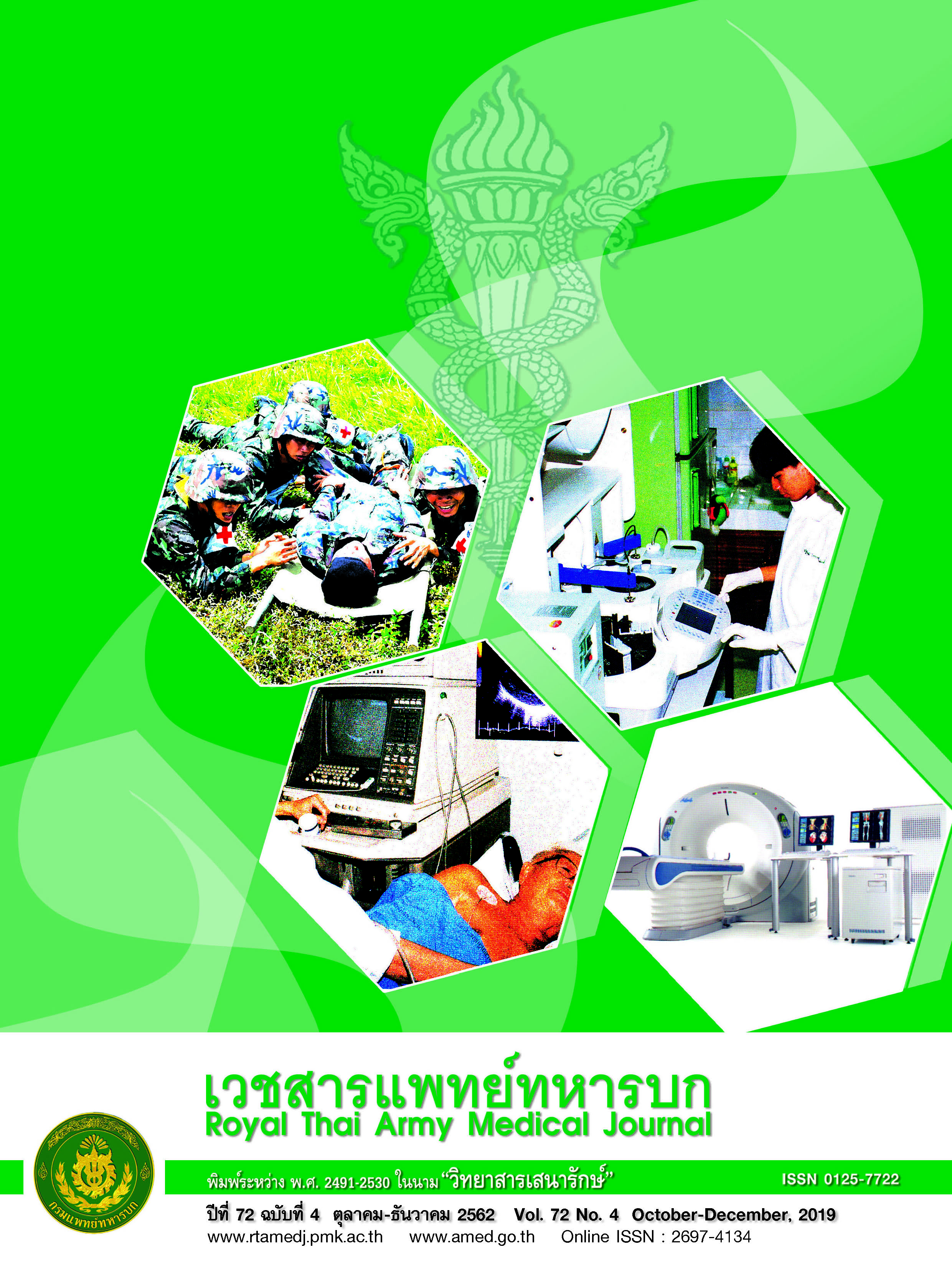ระดับของทักษะทางสังคมในเด็กกลุ่มอาการออทิซึม
Main Article Content
บทคัดย่อ
บทนำ ความบกพร่องของทักษะทางสังคมในเด็กกลุ่มอาการออทิซึมมีความแตกต่างกันไปในแต่ละคน การใช้เครื่องมือประเมินทักษะทางสังคมจึงมีความสำคัญอย่างมากในการวางแผนการรักษาให้เหมาะสม ในประเทศไทยยังไม่มีการศึกษาเรื่องทักษะทางสังคมโดยใช้เครื่องมือมาตรฐานในเด็กกลุ่มอาการออทิซึม วัตถุประสงค์ เพื่อศึกษาทักษะทางสังคมและปัจจัยที่มีผลต่อทักษะทางสังคมในเด็กกลุ่มอาการออทิซึมอายุ 6-17 ปี ในโรงพยาบาลพระมงกุฎเกล้า วิธีการ เป็นการศึกษาแบบภาคตัดขวางโดยให้ผู้ปกครองของเด็กกลุ่มอาการออทิซึมทำแบบประเมินทักษะทางสังคมที่ชื่อว่า Autism Social Skill Profile และทำแบบสอบถามทั่วไปซึ่งถามเกี่ยวกับข้อมูลพื้นฐานของเด็กและครอบครัว ผู้ช่วยนักวิจัยรวบรวมข้อมูลทางคลินิกจากเวชระเบียน สถิติที่ใช้คือ ค่าเฉลี่ย ส่วนเบี่ยงเบนมาตรฐาน ค่าพิสัยและร้อยละ การวิเคราะห์ปัจจัยที่มีผลต่อทักษะทางสังคมใช้การหาค่าสหสัมพันธ์และการถดถอยเชิงเส้น ผลการศึกษา เด็กกลุ่มอาการออทิซึมที่เข้าร่วมงานวิจัยมีทั้งหมด 50 คน คะแนนทักษะทางสังคมโดยเฉลี่ยเท่ากับ 124.62+30.76 ปัจจัยที่มีผลต่อคะแนนทักษะทางสังคม คือ ระดับสติปัญญา ทักษะทางภาษาและรูปแบบการศึกษาของเด็ก สรุป การประเมินทักษะทางสังคมในเด็กกลุ่มอาการออทิซึมโดยใช้แบบประเมินทักษะทางสังคมสามารถนำมาประยุกต์ใช้ในการวางแผนการรักษาและติดตามอาการได้
Downloads
Article Details
บทความในวารสารนี้อยู่ภายใต้ลิขสิทธิ์ของ กรมแพทย์ทหารบก และเผยแพร่ภายใต้สัญญาอนุญาต Creative Commons Attribution-NonCommercial-NoDerivatives 4.0 International (CC BY-NC-ND 4.0)
ท่านสามารถอ่านและใช้งานเพื่อวัตถุประสงค์ทางการศึกษา และทางวิชาการ เช่น การสอน การวิจัย หรือการอ้างอิง โดยต้องให้เครดิตอย่างเหมาะสมแก่ผู้เขียนและวารสาร
ห้ามใช้หรือแก้ไขบทความโดยไม่ได้รับอนุญาต
ข้อความที่ปรากฏในบทความเป็นความคิดเห็นของผู้เขียนเท่านั้น
ผู้เขียนเป็นผู้รับผิดชอบต่อเนื้อหาและความถูกต้องของบทความของตนอย่างเต็มที่
การนำบทความไปเผยแพร่ซ้ำในรูปแบบสาธารณะอื่นใด ต้องได้รับอนุญาตจากวารสาร
เอกสารอ้างอิง
2. Baio J, Wiggins L, Christensen DL, Maenner MJ, Daniels J, Warren Z, et al. Prevalence of autism spectrum disorder among children aged 8 years-autism and developmental disabilities monitoring network, 11 sites, United States, 2014. MMWR Surveill Summ. 2018;67(6):1-23.
3. Center of Disease Control and Prevention. Data and statistics on autism spectrum disorder [Internet]. 2019 [cited 2019 Apr 15]. Available from: https://www.cdc.gov/ncbddd/autism/data.html.
4. Baxter AJ, Brugha TS, Erskine HE, Scheurer RW, Vos T, Scott JG. The epidemiology and global burden of autism spectrum disorders. Psychol Med. 2015;45(3):601-13.
5. Poolsuppasit S, Panyayong B, Liknapichitkul D, Serisathien P, Chutha W. Holistic care for Thai autism. Journal of Mental Health of Thailand. 2005;13(1):10-16.
6. Bellini S. Building social relationships: a systematic approach to teaching social intervention skills to children and adolescents with autism spectrum disorders and other social difficulties. Kansas: Autism Asperger Publishing; 2006.
7. Bellini S, Peters JK. Social skills training for youth with autism spectrum disorders. Child Adolesc Psychiatr Clin N Am. 2008;17(4):857-73, x.
8. Rotheram-Fuller E, Kim M, Seiple D, Locke J, Greenwell R, Levin D. Social skills assessments for children with autism spectrum disorders. Autism. 2013;3(3):1-8.
9. Williams White S, Keonig K, Scahill L. Social skills development in children with autism spectrum disorders: a review of the intervention research. J Autism Dev Disord. 2007;37(10):1858-68.
10. Bellini S, Hopf A. The development of the autism social skills profile: a preliminary analysis of psychometric properties. Focus Autism Other Dev Disabl. 2007;22(2):80-7.
11. Ogilvie CR, Dieker LA. Video modeling and peer-mediated instruction of social skills for students with autism spectrum disorders. J Dev Disabl 2010;16(3):48-59.
12. Ratcliffe B, Wong M, Dossetor D, Hayes S. The association between social skills and mental health in school-aged children with autism spectrum disorder, with and without intellectual disability. J Autism Dev Disord. 2015;45(8):2487-96.


